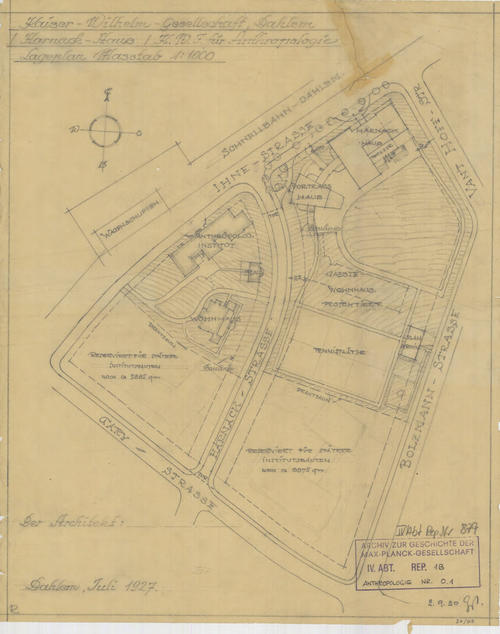Erinnerungsort Ihnestrasse (Ihnestrasse Memorial)
Bauplan für die KWI-A-Gebäude in der Ihnestr. 22 & 24 (Juli 1927)
Image Credit: Archiv der Max-Planck-Gesellschaft, Berlin-Dahlem (AMPG, IV, I, 879)
Erinnerungsort Ihnestraße (Ihnestrasse Memorial)
From October 16th 2024, Erinnerungsort Ihnestraße (Ihnestrasse Memorial) is open to the public at Otto Suhr Institute of Political Science of Freie Universität Berlin. The permanent exhibition critically engages with the history of the Kaiser Wilhelm Institute of Anthropology, Human Heredity, and Eugenics (KWI-A). It addresses how science and injustice became intertwined at this specific site and commemorates the victims of this dehumanizing treatment. Erinnerungsort Ihnestraße (Ihnestraße Memorial) is open Monday to Friday from 10.00 am to 6.00 pm. All further information can be found on the website of the memorial at: www.erinnerungsort-ihnestrasse.de.
The History of The Building
Now property of Freie Universität Berlin and used by Otto Suhr Institute of Policial Science, the building at Ihnestraße 22 once housed the KWI-A from 1927 to 1945. The KWI-A soon gained international reputation as an institute for human genetics, "race research" and eugenics. Even as early on as the Weimar Republic this institute espoused and propagated eugenic ideas. Some scholars also used older colonial anthropological research in their work. During the National Socialist period members of the institute used their research to bolster the racist, antisemitic, and ableist policies of persecution and extermination enacted by the Nazis and were implicated in such crimes against humanity.
The Prehistory of The Memorial Site
Erinnerungsort Ihnestraße was developed by the project "Geschichte der Ihnestrasse 22" (History of Ihnestrasse 22") which was established at Freie Universität Berlin in January 2019. For the exhibition, the project team reviewed the already existing research on the history of the KWI-A and on the history of eugenics in Germany and conducted research especially to identify victims of the KWI-A. The project consulted with self-organizations of the relevant victim groups as well as with an academic advisory board while drafting formats and narratives to visualize the history of the KWI-A and the injustices associated with it. Since 2024, Erinnerungsort Ihnestraße has been partially affiliated with the New Center for the History of Freie Universität Berlin.
The project team currently includes the historian Dr. Manuela Bauche (head of project) and the political scientists Sarah Vera John (student assistant). Previously, the team included the historical political scientist Volker Strähle (2019 to April 2021, August 2022 to January 2024) and the historian Dr. des. Kerstin Stubenvoll (April 2021 to August 2022) as research assistants. Also part of the team were Mika Kößler (March 2023 to October 2024) and Danna Marshall (2020 to March 2023) as student assistants.
The architecture and graphic design of the exhibiton has been developed by Thomas Doetsch Architekt and vizibil.
Room 217
14195 Berlin
Office hours
By Appointment
